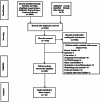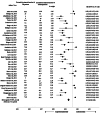Tuberculosis (TB) treatment challenges in TB-diabetes comorbid patients: a systematic review and meta-analysis
- PMID: 38346381
- PMCID: PMC10863515
- DOI: 10.1080/07853890.2024.2313683
Tuberculosis (TB) treatment challenges in TB-diabetes comorbid patients: a systematic review and meta-analysis
Abstract
Background: The Directly Observed Treatment-Short Course (DOTS) Programme was implemented by WHO and includes a combination of four anti-tuberculosis (TB) drugs (isoniazid, pyrazinamide, ethambutol and rifampicin) for a period of six months to eradicate the TB infection completely. Diabetes mellitus (DM) is recognized as one of a strong contributor of TB according to World Health Organization (WHO). The presence of diabetes mellitus type 2 (DM type 2) makes TB treatment complicated. Thus, the objective of the current meta-analysis was to identify and quantify the impact of type 2 DM on treatment outcomes of TB patients treated under the DOTS Programme.
Methods: This meta-analysis was performed according to the Preferred Reporting Items for Systematic Reviews and Meta-Analyses (PRISMA) guidelines. Through a systematic review of relevant literature, we focused on studies investigating treatment outcomes including extended treatment duration and recurrence for individuals with both TB and DM undergoing DOTS therapy. The extracted information included study designs, sample sizes, patient characteristics and reported treatment results.
Results: In 44 studies from different parts of the world, the pooled HR for the impact of DM on extended treatment duration and reoccurrence were HR 0.72, 95% CI 0.56-0.83, p < .01 and HR 0.93, 95% CI 0.70-1.04, p = .08, respectively. The pooled HR for impact of DM on composite TB treatment outcomes was calculated as 0.76 (95% CI 0.60-0.87), p < .01 with an effect size of 41.18. The heterogeneity observed among the included studies was moderate (I2 = 55.79%).
Conclusions: A negative impact of DM was found on recurrence and extended treatment duration in TB patients treated with DOTS therapy. DM type 2 is responsible for the TB treatment prolongation and TB recurrence rates. By implementing effective management strategies and advancing research, the challenges can be mitigated, arising due to the complex interaction between DM and TB.
Keywords: Diabetes mellitus; comorbidity; disease progression; extended treatment duration; recurrence; tuberculosis.
Conflict of interest statement
No potential conflict of interest was reported by the author(s).
Figures






References
-
- Adane HT, Howe RC, Wassie L, et al. Diabetes mellitus is associated with an increased risk of unsuccessful treatment outcomes among drug-susceptible tuberculosis patients in Ethiopia: a prospective health facility-based study. J Clin Tuberc Other Mycobact Dis. 2023;31:100368. doi: 10.1016/j.jctube.2023.100368. - DOI - PMC - PubMed
Publication types
MeSH terms
Substances
LinkOut - more resources
Full Text Sources
Medical
